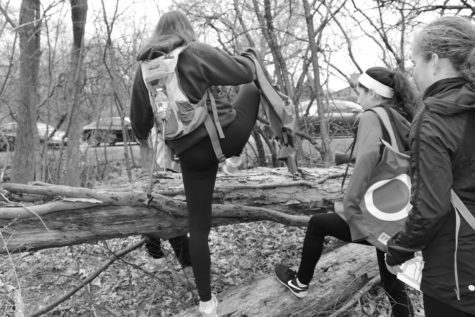Teachers organize trip to Costa Rica

Photo by Nora Smith
Carrying water bottles, sunscreen and heavy backpacks, a group of students trekked their way through the damp and muddy Somme Woods in Northbrook.
This hike was designed to simulate the experiences students would have walking through the terrain of Costa Rica.
“I wanted [the students] to wear all the things they were planning on wearing and bring all the things they were planning on bringing,” said science teacher Amy Ludolph.
Science teacher Bud Mathieu said he went to Costa Rica in the summer of 2012 as part of a team of teachers dedicated to preserving the environment for future generations. His experiences inspired the decision to organize a student trip to Costa Rica, which 20 students are signed up to attend. The trip is set to take place from June 18 to June 27.
Glenbrook North plans to offer a travel opportunity related to science every summer to allow students to experience places outside of Northbrook. The location for the summer of 2018 is expected to be the Galapagos Islands in Ecuador.
According to Ludolph, the Costa Rica trip was open to all students, but registration is now closed.
The cost for each student varied depending on when the student registered, as the price increased closer to the departure date. The average cost for each student was $2,725.
Ludolph said the main reason for taking this trip is to allow students to develop a greater appreciation for nature and provide them with a broader worldview.
“[I hope students take away] that piece of appreciating our environment and our one Earth that we have,” said Ludolph. “There’s no place else to go, and I hope they work harder at saving [the environment] and bringing that message back to their friends and to the community here [in Northbrook]. I think it can be one of those trips that can be life-changing.”
The itinerary includes a tour of coffee plantations, a visit to the Arenal Volcano, a kayaking trip along Lake Arenal, a crocodile boat tour, viewing a butterfly sanctuary, trips to national parks and ziplining.
Mathieu said Costa Rica was chosen as the destination for the trip mainly due to its conservation techniques, affordability and safety.
“Costa Rica is a model nation of sustainability coming from [teaching] the environment science class,” said Mathieu. “A [high percentage] of their country is national parks, and they’re very encouraging of businesses to recycle products and use sustainable energy, so there [are] some things we can learn from them.”
Sophomore Anna Tsyrulnikov, who is expected to go on the trip, said she decided to go because she wanted to be exposed to a culture unknown to her.
“I’m excited to go somewhere tropical, especially Latin America, because there are so many native Spanish speakers, and [I want] to observe some of the culture,” said Tsyrulnikov. “I’m also looking forward to adventures like ziplining and maybe going out of my comfort zone.”
Ludolph said she was an advocate for the trip to Costa Rica because she wanted to give students an eye-opening experience.
“I love the environment, and that’s one of the things I really wanted kids to appreciate more,” said Ludolph. “We spend so much time inside that we are not really getting the chance to be one with nature.”

